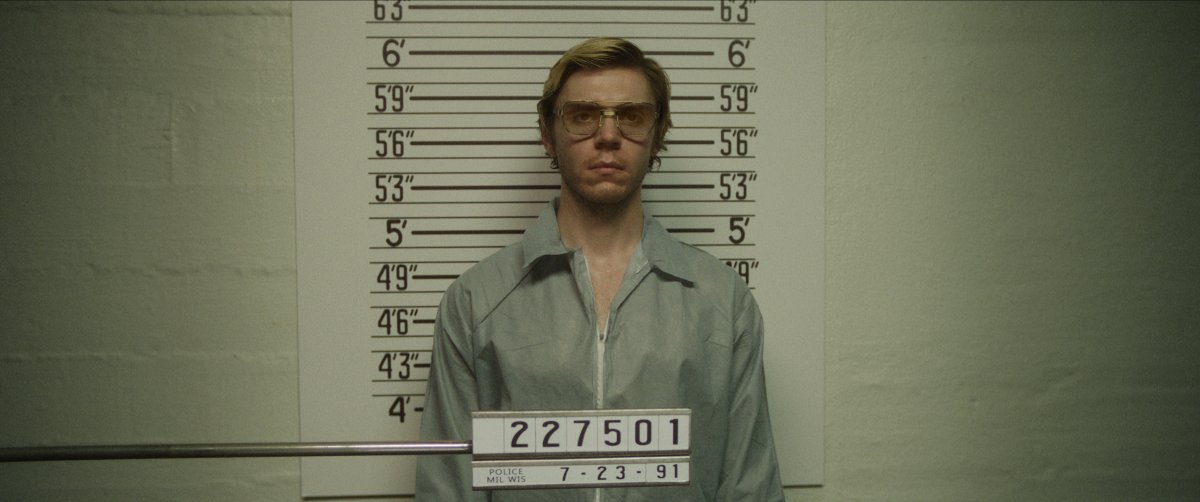Thanks to Netflix's new series DAHMER—Monster: The Jeffrey Dahmer Story, the serial killer's face is everywhere right now.
The streamer's most-watched series since season four of Stranger Things in May 2022, DAHMER racked up 196.2 million viewing hours in its first week alone. As well as trending on social media, Google searches for the cannibal have soared, as have debates on true-crime forums.

Across 10 episodes, the show aims to portray Dahmer through the eyes of his 17 victims. Dahmer sexually assaulted, murdered and dismembered mostly young gay men and boys, preserving some and eating others.
Episodes three and four are dedicated to Dahmer's troubled childhood and teen years, with episode eight and 10 dealing with his neglectful parents' guilt.
Crime Viral founder Cheish Merryweather believes Dahmer's traumatic early life was instrumental in turning him into a murderer. In her talk "How to Raise a Serial Killer," Merryweather uses case studies and interviews to explore how an innocent child can grow up to become a monster—including Dahmer.
"He's such a rare case," the true-crime writer told Newsweek. "Which is why I think he still fascinates us."
'Dahmer Was an Anomaly'
Since he was caught in 1991, there have been six biographies about Dahmer's life, as well as seven fictionalized on-screen portrayals. The Netflix adaptation was created by Ryan Murphy and Ian Brennan, and stars American Horror Story alum Evan Peters as Dahmer.
Dahmer was born in Milwaukee, Wisconsin, in 1960. His father, Lionel, was a research chemist and his mother, Joyce, was a homemaker. When it comes to the childhood experiences of serial killers, Merryweather says that Dahmer is an anomaly.
"Usually, what we'd look for in a serial killer's background is some physical or emotional abuse from the parents," Merryweather said. "But, to our knowledge, that was non-existent with Dahmer."
Although he wasn't physically or emotionally abused, Dahmer was neglected by his parents. His mother suffered from mental-health issues—most likely beginning with postnatal depression—which his father struggled to cope with. Instead, Lionel retreated to his lab, leaving an unstable and heavily medicated Joyce alone for long stretches with her two children.
"When we talk about a traumatic childhood, it doesn't have to be physical," said Merryweather. "It can be stressful events such as this. From a young age, he was retiring to this fantasy world to deal with what's going on around him."
Lionel was aware that his wife was having a major breakdown. As well as the emotional peaks and valleys, he would occasionally wake up in the middle of the night to find her lying in a field in her nightgown.
"He knew she was really suffering," Merryweather said. "But they didn't talk about their problems out loud."
'Loner'
Based on his father's emotional avoidance, Merryweather says that Dahmer learned how to hide his feelings early in life. Still, he was described as "an energetic and happy child" until the age of four, when he underwent surgery for a double hernia on his groin.
Lionel—who released a book on his experiences in 1994 called A Father's Story—was convinced the operation is what sent Dahmer down his murderous path, and Merryweather agrees.
"It was really significant," she said. "The procedure would have been terrifying for an adult, let alone a small child, and it was never explained to him what was happening.
"He woke up from the anesthetic and just had this intense pain in his groin. From the age of four years old, he developed this massive distrust in the world."

As a child, Dahmer had an obsession with animal bones that he gathered from underneath the house. Believing he was encouraging his son's interest in science, Lionel taught Dahmer how to remove the flesh from the bones of roadkill using chemicals.
"It was the exact same solution that Jeffrey would later use to dissolve his victims in the blue drum," Merryweather said.
When Dahmer was six, the family moved from Wisconsin to Ohio. The move, along with the birth of his brother David, seemed to unsettle Dahmer further, whose shyness and low self-esteem stopped him from bonding with other children.
Shortly after the move, his trust issues also worsened due to a prank by a schoolmate.
"His school friend invited Jeffrey to strangle him around the neck, promising not to tell the teachers," said Merryweather.
"Jeffrey went to put his hands on the friend's neck, and the little boy went straight to the teacher to tell them about the incident.
"He remembered receiving 10 lashes on his backside because of this incident, which gave him a lifelong lesson in trusting the words of others."
Merryweather says this is one reason why Dahmer wouldn't let his victims go after sedating and sexually assaulting them.
"He learned from the age of 6 that if they leave, I'm in trouble," she said.
By high school, he had become a loner, as well as developing a drinking problem. It was around this time that Dahmer realized he was gay, and, at age 14, his interest in murder and necrophilia began.
After his parents' divorce, Dahmer moved in with his religious grandma, who threw him out after catching him with another man. He enrolled at Ohio State University, but his alcohol abuse caused him to drop out after one semester. He was also discharged from the army over his drunken antics.
Dahmer committed his first murder in 1978 at the age of 18. His first kill was a hitchhiker named Steven Hicks, whom Dahmer lured back to his parents' empty house and buried in the yard.
Merryweather said Dahmer's dark fantasies, combined with the isolation from his peers and distrust in the world, are what turned him into the "poster boy for serial-murdering cannibalism."
"The [Netflix] series shows he was a real-life monster," Merryweather said. "This is what he actually did."
Uncommon Knowledge
Newsweek is committed to challenging conventional wisdom and finding connections in the search for common ground.
Newsweek is committed to challenging conventional wisdom and finding connections in the search for common ground.
About the writer
Sophie is a Newsweek Pop Culture and Entertainment Reporter based in Lincoln, UK. Her focus is reporting on film and ... Read more
To read how Newsweek uses AI as a newsroom tool, Click here.






